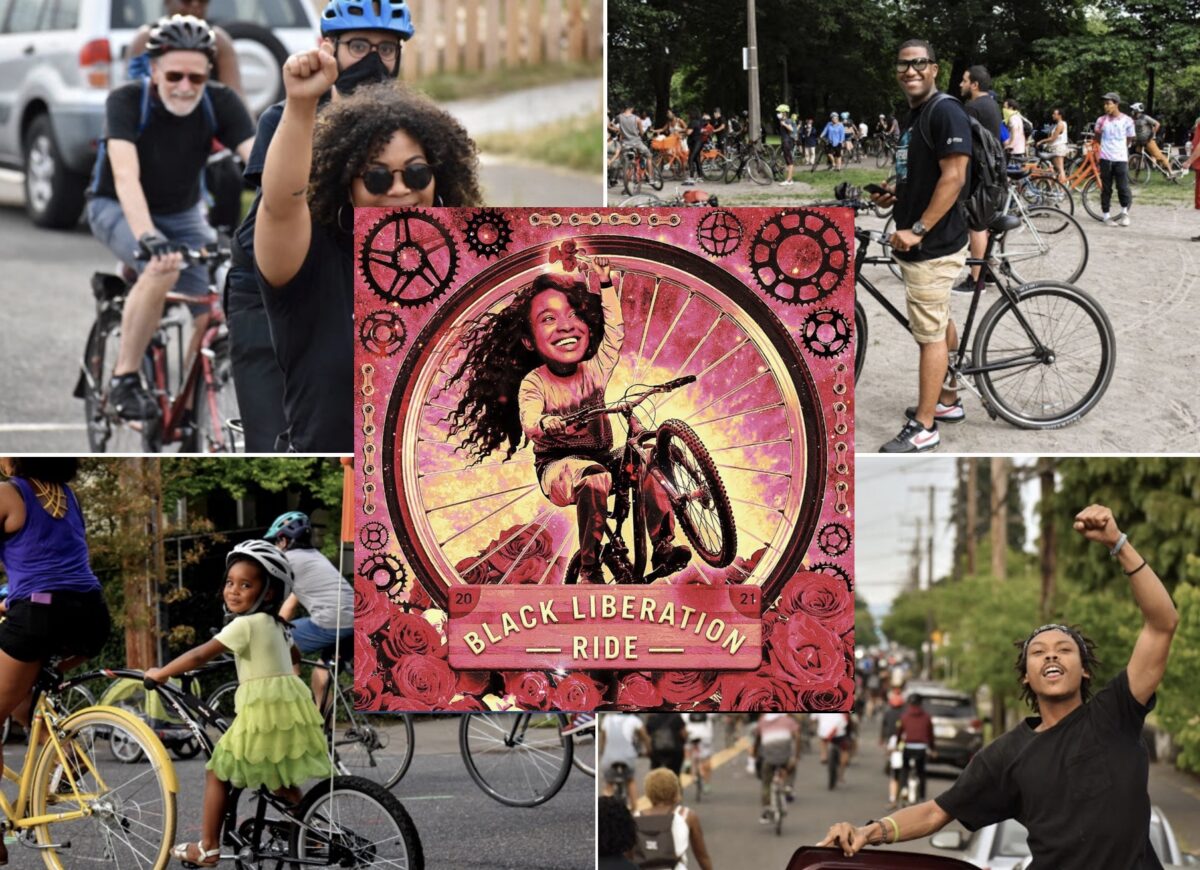
This Saturday is Juneteenth, a newly-named official state holiday to commemorate the end of slavery in the United States, and there are a lot of ways to celebrate by bike.
The headline event is the annual Black Liberation Ride, back after its huge success last year. “So much has happened since the 2020 ride, and this ride will be centered around community, BIPOC allyship, and taking up space together on Portland streets,” writes ride organizer Stephen Marea. “We rolled so deep last year and it is time to make the ground shake again.” Marea (stay tuned for more from him here on the front page) also wants folks to know that the ride is only for, “Black riders and POC [people of color] allies.”
If the ride isn’t your thing, roll on down to the North Park Blocks where the Vanport Mosaic Festival have put together the “History Is Now” exhibit as part of the City of Portland’s public plaza program. This is an excellent opportunity to learn about the history of the Vanport neighborhood and the flood that wiped it out 73 years ago. The exhibit features educational storefront window displays, free zines from the Zine Machine, and more.
Advertisement
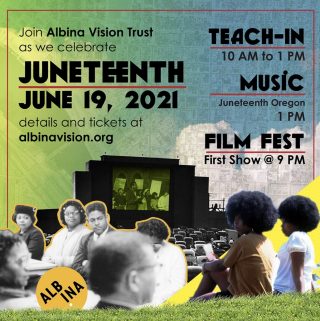
One your way to or from the North Park Blocks, take a slow ride up North Williams Avenue and stop at the signs that are part of the Historic Black Williams Avenue Art Installation. And don’t forget to swing a few blocks west once you get to North Going Street where you’ll find a cool hidden path with a wonderful mural that shares words and images of the lives and struggles of Black Portlanders.
If you need a rest from the road, get comfortable and join the Juneteenth Teach-in Workshop hosted by Albina Vision Trust (10:00 am to 1:00 pm on Saturday). This event will give you a deeper understanding of the rich history of the Albina neighborhood — “the heart of Portland’s Black community for many generations” before it was paved over for parking lots and a freeway.
— Jonathan Maus: (503) 706-8804, @jonathan_maus on Twitter and jonathan@bikeportland.org
— Get our headlines delivered to your inbox.
— Support this independent community media outlet with a one-time contribution or monthly subscription.



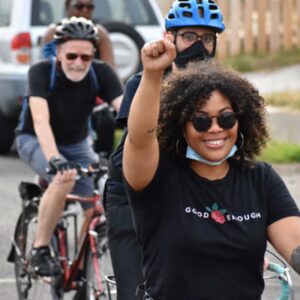
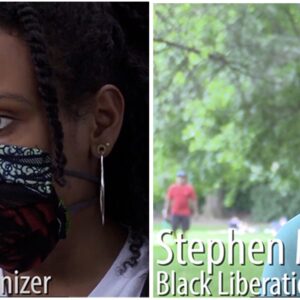
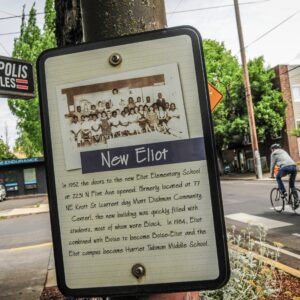
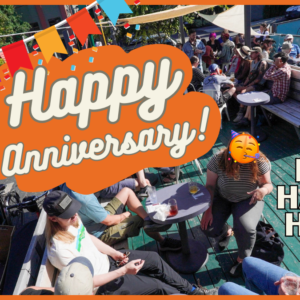
Thanks for reading.
BikePortland has served this community with independent community journalism since 2005. We rely on subscriptions from readers like you to survive. Your financial support is vital in keeping this valuable resource alive and well.
Please subscribe today to strengthen and expand our work.
Slavery did not actually “end” until April 28th, 1866. That is when the Native American Choctaw tribe by treaty, officially freed their (many) slaves. Juneteenth is/was a holiday commemorating the arrival of a Union General to Galveston, Texas. Lincolns Emancipation Proclamation was only able to be enforced when Union forces took back a Confederate controlled place.
Mechablurgh…you bring up an interesting point (and I learned something new)…as to “what date” should be the ‘true point’ when the institution of human slavery ended on the continental US. Thus interesting how Juneteenth has started to take such national significance vs. the Texas holiday (for the state event it marks and has commemorated since the 1980s) vs. April 28, 1866.
I’ve been doing some legal research into Oregon’s racist laws targeting African-Americans, and I thought I’d share what I found since I cannot go on the ride:
In 1843, a small group of white men formed the Oregon Territory and created its original colonial laws. By popular vote, they made the territory slavery-free. The language of the law is similar to what would later become the 13th Amendment to the US Constitution (outlawing slavery). The voters were mostly farmers from non-slaver states who favored excluding Blacks entirely due to what they saw as unfair competition with others who used slave labor. But of course by then some slavers and their captives had already settled in the part of the territory that would become Oregon.
The following year, the first territorial legislature set a time limit for slavers to “remove” their slaves from the territory. This effectively legalized slavery in Oregon for three years (the time limit for removing a male slave). Although the law made the slavers responsible for removing their “property,” the law punished the “property” for not being removed. The prescribed punishment was beating with a lash.
The law became known as “Peter Burnett’s lash law,” and here’s what he had to say about it:
“The object is to keep clear of that most troublesome class of population [Blacks]. We are in a new world, under the most favorable circumstances and we wish to avoid most of those evils that have so much afflicted the United States and other countries.”
Voters soon rescinded the punishment, apparently before anyone was actually punished under it.
In 1849, the territorial legislature passed the first infamous exclusion law, which said “it shall not be lawful for any negro or mulatto to enter into, or reside” in Oregon. The law was based on the legislature’s concern that Blacks might “intermix with Indians, instilling into their minds feelings of hostility toward the white race.” Some people were expelled under the law, until it was rescinded in 1854.
Oregon flirted with slavery again at statehood, when delegates to the constitutional convention in 1857 submitted to voters a proposal to legalize slavery and to exclude free Blacks. The voters rejected slavery, but approved exclusion. In addition to prohibiting Blacks from entering the State, the new constitution prohibited them from owning property and from making contracts.
This made Oregon the only “free” state to deny fundamental human rights to Blacks. It would have also had a disastrous impact on any free Blacks in Oregon, as it would have allowed State officials to confiscate any property the person had purchased and to deny the person any benefits he or she had earned under any contract (eg, pay for work).
The law was effective in discouraging Black settlement in Oregon, even though it was generally not enforced. It was invalidated by enactment of the 14th Amendment to the US Constitution (guaranteeing equal protection under law on the basis of race and imposing the restrictions of the Bill of Rights on State governments) after the Civil War.
The 14th Amendment also invalidated any other Oregon law targeting African-Americans. However, discriminatory practices against African-Americans in several key sectors of the economy (eg, housing, employment) has remained rampant, becoming marginally less severe after passage of the federal Civil Rights Act of 1964. Oregon law has been largely ineffective in redressing this systematic deprivation of human rights.
Current Oregon law provides distinct criminal penalties for any private party who assaults or threatens a person based on the assailant’s perception of the victim’s race. There are prosecutions in Oregon each year for such crimes against African-Americans.
However, current Oregon law (and federal law) privileges State agents to use force in the course of duty in a manner that enables racially-motivated violence by State actors. This has become perhaps the most salient example of the legal system’s ongoing role in the systemic deprivation of the human rights of African-Americans.
Courtesy of the Oregon Historical Society: https://www.oregonencyclopedia.org/articles/exclusion_laws/#.YMqAlC1h1p9
And your friendly neighborhood member of the Oregon State Bar.
Excellent summary! For those who don’t know, a huge debt of gratitude goes to Walidah Imarisha, an author and professor at PSU who helped further uncover and popularize Oregon’s racist history with her project Why Aren’t There More Black People in Oregon?: A Hidden History — this ultimately prompted regional and national discussions (such as this equally-good Atlantic article about Portland specifically) over the past five years.
I don’t mean at all to discount The Dude’s important round-up here, I just think it’s worth acknowledging why so many people (especially us white folks) are talking about this today.
Also, taking the lead from black scholars and authors, I think it’s worth shifting from talking about “slaves” to “enslaved people” as a way to recognize the humanity of people in the midst of an inhuman society. It’s something I have to remind myself to do, but I think it’s worth it.
Thanks for posting Professor Imarisha’s presentation. It is an excellent history. On the legal side, I didn’t know about the non-white person tax. I also didn’t know it took Oregon over 100 years to ratify the 14th Amendment, but I suppose it’s not surprising given that Oregon didn’t act on the racist language in its constitution until 2001.
“the ride is only for, “Black riders and POC [people of color] allies.””
I want to ride this if I can, but I would like a clarification on the above sentence:
Is it suggesting
– allies who are POC or;
– allies of black and POCs?
If a person who is white and also considers themselves an ally, welcome on the ride?
No. Sorry if that wasn’t clear. The ride is for Black people and people of color (who don’t identify as Black).